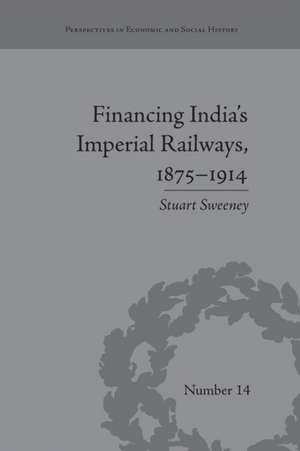Financing India's Imperial Railways, 1875-1914: Perspectives in Economic and Social History
Autor Stuart Sweeneyen Limba Engleză Paperback – 21 ian 2016
| Toate formatele și edițiile | Preț | Express |
|---|---|---|
| Paperback (1) | 449.41 lei 6-8 săpt. | |
| Taylor & Francis – 21 ian 2016 | 449.41 lei 6-8 săpt. | |
| Hardback (1) | 1112.83 lei 6-8 săpt. | |
| Taylor & Francis – sep 2011 | 1112.83 lei 6-8 săpt. |
Din seria Perspectives in Economic and Social History
-
 Preț: 311.81 lei
Preț: 311.81 lei -
 Preț: 277.56 lei
Preț: 277.56 lei -
 Preț: 310.55 lei
Preț: 310.55 lei -
 Preț: 312.34 lei
Preț: 312.34 lei -
 Preț: 449.41 lei
Preț: 449.41 lei - 18%
 Preț: 1111.40 lei
Preț: 1111.40 lei -
 Preț: 489.26 lei
Preț: 489.26 lei - 18%
 Preț: 1161.31 lei
Preț: 1161.31 lei - 18%
 Preț: 1058.38 lei
Preț: 1058.38 lei - 18%
 Preț: 1056.95 lei
Preț: 1056.95 lei -
 Preț: 132.04 lei
Preț: 132.04 lei -
 Preț: 212.61 lei
Preț: 212.61 lei -
 Preț: 449.41 lei
Preț: 449.41 lei - 18%
 Preț: 947.90 lei
Preț: 947.90 lei - 18%
 Preț: 1057.89 lei
Preț: 1057.89 lei - 18%
 Preț: 1061.22 lei
Preț: 1061.22 lei - 18%
 Preț: 1109.99 lei
Preț: 1109.99 lei - 18%
 Preț: 1112.83 lei
Preț: 1112.83 lei - 18%
 Preț: 1057.75 lei
Preț: 1057.75 lei - 18%
 Preț: 1054.71 lei
Preț: 1054.71 lei - 18%
 Preț: 1057.26 lei
Preț: 1057.26 lei - 18%
 Preț: 1161.31 lei
Preț: 1161.31 lei - 18%
 Preț: 1112.65 lei
Preț: 1112.65 lei - 18%
 Preț: 1112.83 lei
Preț: 1112.83 lei - 18%
 Preț: 1002.63 lei
Preț: 1002.63 lei - 18%
 Preț: 1112.21 lei
Preț: 1112.21 lei -
 Preț: 449.41 lei
Preț: 449.41 lei - 18%
 Preț: 1112.03 lei
Preț: 1112.03 lei -
 Preț: 445.95 lei
Preț: 445.95 lei - 18%
 Preț: 1058.52 lei
Preț: 1058.52 lei - 18%
 Preț: 1053.16 lei
Preț: 1053.16 lei - 18%
 Preț: 702.85 lei
Preț: 702.85 lei - 18%
 Preț: 1054.75 lei
Preț: 1054.75 lei - 18%
 Preț: 1109.36 lei
Preț: 1109.36 lei - 18%
 Preț: 1057.75 lei
Preț: 1057.75 lei - 18%
 Preț: 1056.80 lei
Preț: 1056.80 lei - 18%
 Preț: 1110.29 lei
Preț: 1110.29 lei - 18%
 Preț: 1056.32 lei
Preț: 1056.32 lei - 18%
 Preț: 1163.99 lei
Preț: 1163.99 lei - 18%
 Preț: 1164.44 lei
Preț: 1164.44 lei - 18%
 Preț: 1114.40 lei
Preț: 1114.40 lei - 18%
 Preț: 1004.20 lei
Preț: 1004.20 lei - 18%
 Preț: 998.71 lei
Preț: 998.71 lei
Preț: 449.41 lei
Nou
Puncte Express: 674
Preț estimativ în valută:
86.00€ • 93.39$ • 72.24£
86.00€ • 93.39$ • 72.24£
Carte tipărită la comandă
Livrare economică 22 aprilie-06 mai
Preluare comenzi: 021 569.72.76
Specificații
ISBN-13: 9781138664357
ISBN-10: 1138664359
Pagini: 272
Dimensiuni: 156 x 234 x 14 mm
Greutate: 0.45 kg
Ediția:1
Editura: Taylor & Francis
Colecția Routledge
Seria Perspectives in Economic and Social History
Locul publicării:Oxford, United Kingdom
ISBN-10: 1138664359
Pagini: 272
Dimensiuni: 156 x 234 x 14 mm
Greutate: 0.45 kg
Ediția:1
Editura: Taylor & Francis
Colecția Routledge
Seria Perspectives in Economic and Social History
Locul publicării:Oxford, United Kingdom
Cuprins
Introduction; Chapter 1 ‘Productive’ Indian Railways, 1875–1914: Space for Gentlemanly Capitalists and Industrialists in a Mixed Economy; Chapter 2 Indian Railways and Famines, 1875–1914: Magic Wheels and Empty Stomachs; Chapter 3 Military Railways in India, 1875–1914: Russophobia, Technology and the Indian Taxpayer; Chapter 4 Indian Railroading: Floating Railway Companies in the Late Nineteenth Century; Chapter 5 Northern Wars and Southern Diplomacy: Sir Douglas Forsyth’s Second Career on the Indian Railways; Chapter 6 Eminent ICS Victorians: Richard Strachey and Theodore Hope as Poachers and Gamekeepers; Chapter 7 Background, Proceedings and Legacy of the Mackay Committee of 1908: Gentlemanly Capitalists, Indian Nationalists and Laissez-Faire; conclusion Conclusion;
Descriere
The Indian railway network began as a liberal experiment to promote trade and commerce, the distribution of food and military mobility. Sweeney's study focuses on Britain's largest overseas investment project during the nineteenth century, offering a new perspective on the Anglo-Indian experience.














